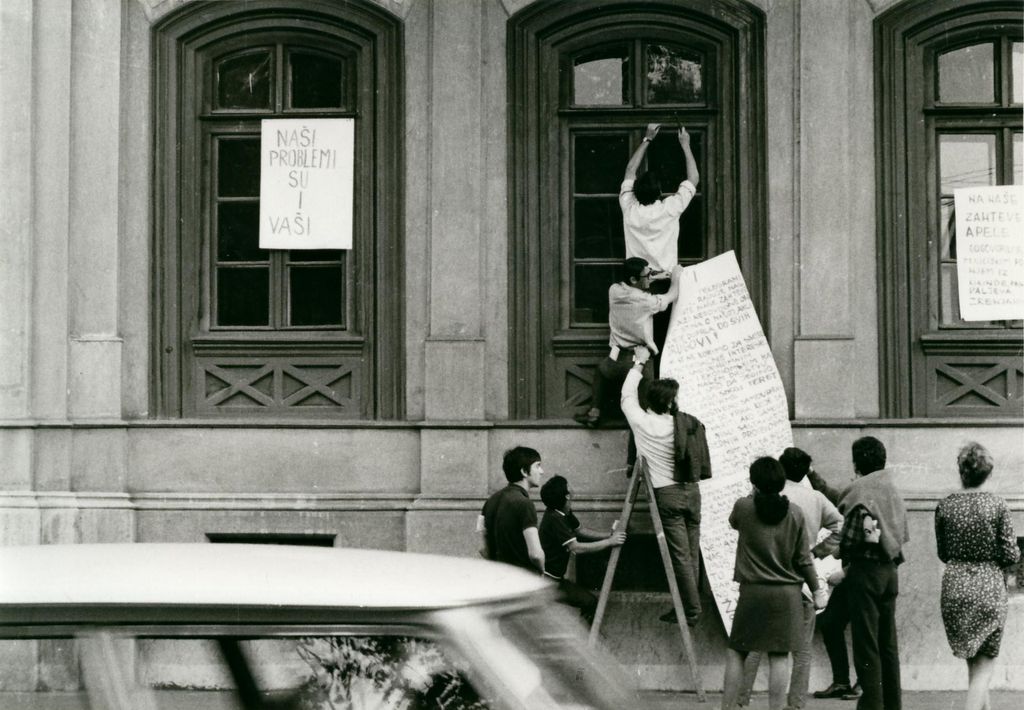
HAZİRAN KALKIŞMASI / JUNE TURMOIL / LIPANJSKA GIBANJA
27. AUFF,GÖSTERİMLER / SCREENINGS,DÜNYA SİNEMASI GÖSTERİMİ / WORLD CINEMA SCREENINGS,Çok Uzaktan Gelmiş Olamayız!”: Želimir Žilnik Toplu Gösterimi / We Couldn't Have Come From This Far Away!”: Želimir Žilnik Retrospective
Takvime Ekle
Europe/Istanbul
HAZİRAN KALKIŞMASI / JUNE TURMOIL / LIPANJSKA GIBANJA
Yugoslavya – Yugoslavia / 1969 / 11’ / HD / Siyah&Beyaz-Black&White / Sırpça, Hırvatça – Serbian, Croatian > Türkçe ve İngilizce Altyazı - Turkish and English Subtitles
Yönetmen /Director: Želimir Žilnik
Senaryo / Screenplay: Želimir Žilnik
Görüntü Yönetmeni / Director of Photography: Dušan Ninkov
Kurgu / Editing: Miodrag Petrović-Šarlo
Ses / Sound: Bogdan Tirnanić, Branko Vučićević
Oyuncular / Cast: Dragoljub Micunović, Dragoljub Vojnov, Stevo Zigon
Yapım / Production Company: Neoplanta Film
Kopya Temini / Print Source: Sarita Matijevic (smatijevic@sbb.rs)
Film Haziran 1968’de Belgrad’daki öğrenci hareketlerini belgeliyor. Protestolardaki, eşitlik, coşku ve disiplin üzerine vurgu yapıyor. Filmin büyük bölümü, öğrencilerin ve onlara destek veren ünlü sanatçıların toplandığı, Felsefe Fakültesi binasının avlusunda çekilmiş. Yapılmış en güçlü kızıl burjuva –ya da komünizmin maşaları- , yani Doğu bloklarında yeni nesillerde yaratıcılığı baskılayan zihniyetin eleştirisi. Žilnik, filmografisinde öne çıkacak şeyi yapıyor ve profesyonel bir oyuncuyu gerçek hayattan bir kesite dahil ediyor: Uçsuz bucaksız bir kalabalığın önünde, Stevo Žigon, Büchner’in Danton’un Ölümü’nden alınmış Robespierre’in monoloğunu canlandırıyor. Žilnik, bir gözlemci olmaktan çıkıp hikayenin içindeki biri oluyor; bir yönetmen.
The film documents of student demonstrations in Belgrade, in June 1968. It speaks of the critical equality, enthusiasm and discipline of this form of protest. It was shot for the most part in the court of Kapetan Mišino Zdanje (Faculty of Philosophy building), where students gathered up and where famous artists participated thus showing solidarity with the students. It was the most powerful public criticism of “red bourgeoisie” – members of communist apparatus, who suppressed creativity and affirmation of new generations throughout Eastern Block. Žilnik has a go on what would become one of the traits of his filmography, the immersion of a professional actor in a real life situation: in front of an immense crowd, Stevo Žigon declaims Robespierre’s monologue extracted from Dantons Tod (Danton’s Death) by Büchner. Žilnik goes from being an observer to becoming an active participant in the story, a film director.
Yönetmen /Director: Želimir Žilnik
Senaryo / Screenplay: Želimir Žilnik
Görüntü Yönetmeni / Director of Photography: Dušan Ninkov
Kurgu / Editing: Miodrag Petrović-Šarlo
Ses / Sound: Bogdan Tirnanić, Branko Vučićević
Oyuncular / Cast: Dragoljub Micunović, Dragoljub Vojnov, Stevo Zigon
Yapım / Production Company: Neoplanta Film
Kopya Temini / Print Source: Sarita Matijevic (smatijevic@sbb.rs)
Film Haziran 1968’de Belgrad’daki öğrenci hareketlerini belgeliyor. Protestolardaki, eşitlik, coşku ve disiplin üzerine vurgu yapıyor. Filmin büyük bölümü, öğrencilerin ve onlara destek veren ünlü sanatçıların toplandığı, Felsefe Fakültesi binasının avlusunda çekilmiş. Yapılmış en güçlü kızıl burjuva –ya da komünizmin maşaları- , yani Doğu bloklarında yeni nesillerde yaratıcılığı baskılayan zihniyetin eleştirisi. Žilnik, filmografisinde öne çıkacak şeyi yapıyor ve profesyonel bir oyuncuyu gerçek hayattan bir kesite dahil ediyor: Uçsuz bucaksız bir kalabalığın önünde, Stevo Žigon, Büchner’in Danton’un Ölümü’nden alınmış Robespierre’in monoloğunu canlandırıyor. Žilnik, bir gözlemci olmaktan çıkıp hikayenin içindeki biri oluyor; bir yönetmen.
The film documents of student demonstrations in Belgrade, in June 1968. It speaks of the critical equality, enthusiasm and discipline of this form of protest. It was shot for the most part in the court of Kapetan Mišino Zdanje (Faculty of Philosophy building), where students gathered up and where famous artists participated thus showing solidarity with the students. It was the most powerful public criticism of “red bourgeoisie” – members of communist apparatus, who suppressed creativity and affirmation of new generations throughout Eastern Block. Žilnik has a go on what would become one of the traits of his filmography, the immersion of a professional actor in a real life situation: in front of an immense crowd, Stevo Žigon declaims Robespierre’s monologue extracted from Dantons Tod (Danton’s Death) by Büchner. Žilnik goes from being an observer to becoming an active participant in the story, a film director.
T.G. 2204
AnkaraFF is on Twitter
27. AUFF
-
ROHFILM
-
ODALAR / ROOMS
-
YILDIRIM / LIGHTNING STRIKES
-
YENİDEN ÇERÇEVELEME / REFRAME
-
ESİR UFUK / CAPTIVE HORIZON
-
ADOLF WINKELMANN, KASSEL, 09.12.67, 11.54H
-
YAZLIK / SECOND HOME
-
EMPOR
-
YALNIZLIK GİBİ AMA DEĞİL / IT SEEMS TO BE LONLINESS BUT IT IS NOT
-
ABU HAL'A'NIN OĞULLARI / THE SONS OF ABU HAL'A
- Tümünü Göster

